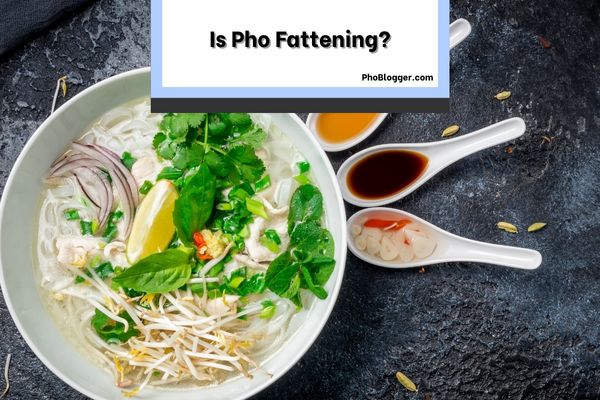Pho, a Vietnamese noodle soup, has recently gained popularity, becoming a go-to comfort food for many people. The dish is beloved for its flavorful broth, tender meat, and fresh herbs and vegetables. However, as with any food, some people are concerned about its nutritional value, particularly when it comes to its potential to contribute to weight gain.
Is pho fattening? In this article, we’ll take a closer look at pho’s ingredients and nutritional content, explore its role in a healthy diet, examine factors that can contribute to its calorie count, and offer strategies for making it a more nutritious meal. Whether you’re a pho enthusiast looking to make informed choices or just curious about the nutritional value of this popular dish, read on to learn more.
Before you scroll further down this guide, “Is Pho Fattening,” you can check out these recent articles from our team:
What is Pho?
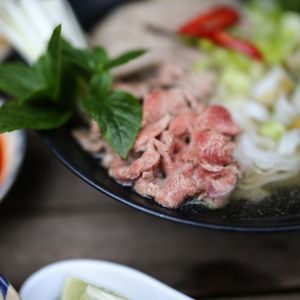
Pho is a traditional Vietnamese dish with a flavorful broth, rice noodles, and various meats or vegetables. The broth simmers beef or chicken bones with spices and herbs, such as cinnamon, star anise, and ginger. The noodles are made from rice flour and are typically thin and delicate. The meat options can include beef, chicken, or meatballs, and the vegetables can include bean sprouts, Thai basil, cilantro, and lime wedges.
Pho is typically served with a side plate of fresh herbs, lime wedges, and chili peppers, allowing diners to customize the flavor. It is a popular street food in Vietnam and has also gained widespread popularity in other parts of the world. Pho is often considered a comfort food enjoyed by people of all ages and backgrounds.
The Role of Pho
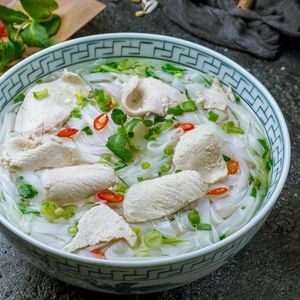
Pho can be a healthy addition to a well-balanced diet, offering several key nutrients and health benefits. Here are a few reasons why pho can be a nutritious meal option:
- Rich in protein: Pho is often made with beef or chicken, both excellent protein sources. Protein is essential for building and repairing tissues and supporting a healthy immune system.
- High in vitamins and minerals: Pho contains a variety of fresh herbs and vegetables, such as basil, cilantro, and bean sprouts, which are rich in vitamins and minerals. These nutrients are important for maintaining good health and preventing chronic diseases.
- Low in fat: While some versions of pho may contain fatty cuts of meat or added oils, the broth is generally low in fat. This can make it a good option for people trying to limit their fat intake.
- Hydrating: Because pho is a soup, it can help to keep you hydrated, which is important for overall health and well-being.
- Comforting: Pho can be a satisfying and comforting meal option, which can help to reduce stress and promote relaxation.
It’s important to note that the nutritional content of pho can vary depending on the specific ingredients and preparation method used. However, when made with fresh, high-quality ingredients and consumed in moderation, pho can be a healthy and flavorful meal option.
Potential Reasons Why Pho Might Be Fattening
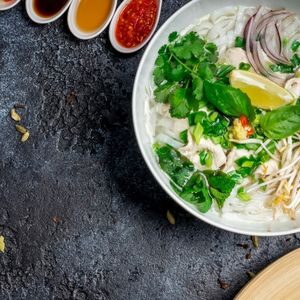
While pho can be a nutritious meal choice, there are a few reasons why it may also be considered fattening in some cases.
Here are some potential factors that can contribute to pho’s calorie count:
- High-calorie toppings: While the broth and noodles in pho are generally low in calories, the toppings used can add up quickly. For example, beef, meatballs, and fried onions are common pho toppings that can significantly increase the calorie count of the dish.
- Large portion sizes: Pho bowls, with some large restaurant portions, can vary widely. If you consume a large bowl of pho, you may take in more calories than you realize.
- Added oils and fats: Some versions of pho are made with added oils or fats, which can increase the calorie count of the dish. For example, the beef used in pho may be cooked in oil before being added to the soup.
- Added sugar: While traditional pho does not contain added sugar, some modern dish variations may use sweetened broths or sauces, which can significantly increase the calorie count.
- Restaurant preparation methods: How pho is prepared in restaurants can also impact its nutritional content. For example, some restaurants may use MSG, a flavor enhancer linked to weight gain in some studies.
Not all pho is created equal, and the dish’s nutritional content can vary widely depending on the ingredients and preparation method used. However, by being mindful of the toppings, portion sizes, and preparation methods, it’s possible to enjoy pho as part of a healthy and balanced diet.
Strategies For Making Pho Less Fattening
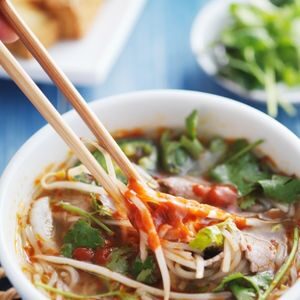
If you’re looking to make pho a healthier meal choice, here are a few strategies to consider:
- Choose a lean protein: Instead of beef or meatballs, opt for leaner protein options like chicken or shrimp. You could skip the meat altogether and opt for a vegetarian or tofu-based pho.
- Skip high-calorie toppings: Skip the fried onions and fatty meat cuts and add more fresh vegetables like bean sprouts, bok choy, and carrots. Herbs like basil and cilantro can also add flavor without adding many calories.
- Control portion sizes: If you’re dining out, consider splitting a bowl of pho with a friend or taking half of it home for later. If you’re making pho at home, use a smaller bowl and be mindful of the amount of protein and noodles you add.
- Make your own broth: Making your own broth at home can help you control the amount of added fats, sugars, and sodium in the dish. Try making a broth with lean beef or chicken bones, fresh herbs, and spices.
- Use healthier noodle options: While traditional pho uses rice noodles, you could consider using lower-calorie and higher-fiber options like zucchini noodles or shirataki noodles.
- Avoid sweetened sauces: Avoid any pho dish with sweetened sauces or broths, as these can significantly increase the calorie count.
By being mindful of your chosen ingredients and how you prepare your pho, you can enjoy this delicious and comforting dish without derailing your healthy eating goals.
Conclusion For “Is Pho Fattening”
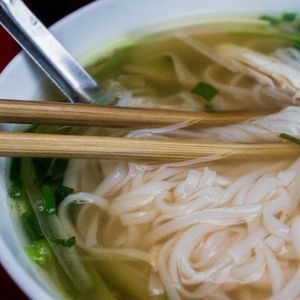
So, is pho fattening? The answer is: it depends. Pho can be a healthy and nutritious meal choice, as it’s rich in protein, vitamins, and minerals and low in fat. However, the calorie count of pho can vary depending on the ingredients used, the portion size, and the way it’s prepared.
To make pho a healthier meal choice, consider lean protein options, skipping high-calorie toppings, controlling portion sizes, making your own broth, using healthier noodle options, and avoiding sweetened sauces.
By doing so, you can enjoy the comfort and flavor of pho without consuming excessive calories. Overall, pho can be a delicious and nutritious meal option as long as it’s consumed in moderation and with a focus on fresh, whole ingredients. So, the next time you’re craving a warm bowl of soup, try pho!
You can learn more about pho by watching “Is Pho Healthy or Not – Will I Gain Weight If I Have It Often” down below:

